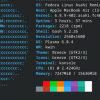Why Linux needs Rexx
Rexx is a scripting language that was invented at IBM years ago. The Linux community has largely ignored Rexx, but I believe it could play an important role in Linux's challenge to the Windows desktop. How can a language many in the Linux community have never even heard of be valuable in Linux's fight for the desktop?
In many ways Rexx is a predecessor to the open source scripting languages that play such a prominent role in Linux. Like many of those languages, Rexx is free, portable, widely used, and standardized. Rexx runs runs anywhere, from handhelds to desktops to servers to mainframes. It enjoys a strong international standard, so scripts run across all these platforms.
Rexx has a world-wide user community that offers good support, hundreds of free tools, and nine different Rexx interpreters optimized for various platforms and purposes. Rexx books, resources, and forums come in a wide variety of spoken languages.
So what, you say? That's all well and good, but it's nothing different from what languages like Perl and Python offer.
What distinguishes Rexx is that it blends ease of use and power through a host of specific techniques. Ease of learning and ease of use are why Rexx came bundled as the scripting language of the Amiga OS and OS/2. Many thousands of developers and end users learned the language through these desktops of yesteryear and still remember it fondly today. Rexx has a proven track record as the driving language for major desktop systems.









































































